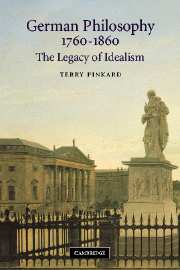Book contents
- Frontmatter
- Contents
- Acknowledgements
- List of abbreviations
- Introduction: “Germany” and German philosophy
- PART I KANT AND THE REVOLUTION IN PHILOSOPHY
- PART II THE REVOLUTION CONTINUED: POST-KANTIANS
- PART III THE REVOLUTION COMPLETED? HEGEL
- PART IV THE REVOLUTION IN QUESTION
- Conclusion: the legacy of idealism
- Bibliography
- Index
Introduction: “Germany” and German philosophy
Published online by Cambridge University Press: 05 June 2012
- Frontmatter
- Contents
- Acknowledgements
- List of abbreviations
- Introduction: “Germany” and German philosophy
- PART I KANT AND THE REVOLUTION IN PHILOSOPHY
- PART II THE REVOLUTION CONTINUED: POST-KANTIANS
- PART III THE REVOLUTION COMPLETED? HEGEL
- PART IV THE REVOLUTION IN QUESTION
- Conclusion: the legacy of idealism
- Bibliography
- Index
Summary
In 1763, one of the many contenders for the title “the first world war” – in this case, the “Seven Years War” – was concluded. Its worldwide effects were obvious – France, besides being saddled with enormous financial losses as a result of the war, was in effect driven out of North America and India by Britain, never to recover its territories there – but, curiously, the war had started and mostly been fought on “German” soil, and one of its major results was to transform (or perhaps just to confirm) the German Land of Prussia into a major European power. It is hard to say, though, what it meant for “Germany,” since, at that point, “Germany,” as so many historians have pointed out, did not exist except as a kind of shorthand for the German-speaking parts of the gradually expiring “Holy Roman Empire of the German Nation.” Once a center of commerce and trade in the Middle Ages and Renaissance, “Germany,” in that shorthand sense, had by the eighteenth century become only a bit player on the European scene, long since having lost much of its economic vitality as trade shifted to the North Atlantic following the voyages of discovery and the intensive colonization efforts in what Europeans described as the “New World.” After suffering huge population losses in the Thirty Years War (1618–1648), “Germany” found itself divided by the terms of the Treaty of Westphalia in 1648 into a series of principalities – some relatively large, some as small as a village – that were held together only by the more-or-less fiction of belonging to and being protected by the laws and powers of the Holy Roman Empire (which as the old joke had it was neither holy, nor Roman, nor an Empire, and which was for that matter neither a state, a confederation, or a treaty organization but a wholly sui generis political entity difficult to describe in any political terms familiar to us now).
- Type
- Chapter
- Information
- German Philosophy 1760–1860The Legacy of Idealism, pp. 1 - 16Publisher: Cambridge University PressPrint publication year: 2002



